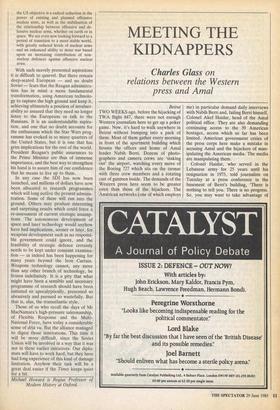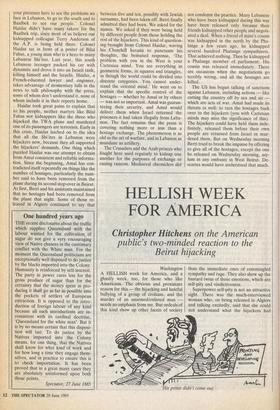MEETING THE KIDNAPPERS
Charles Glass on relations between the Western press and Amal
Beirut TWO WEEKS ago, before the hijacking of TWA flight 847, there were not enough Western journalists here to get up a poker game. Now, it's hard to walk anywhere in Beirut without bumping into a pack of them. Most of them gather every morning in front of the apartment building which houses the offices and home of Amal leader Nabih Beni. Dozens of photo- graphers and camera crews are 'staking out' the airport, watching every move of the Boeing 727 which sits on the tarmac with three crew members and a rotating cast of gunmen inside. The demands of the Western press here seem to be greater even than those of the hijackers. The American networks (one of which employs me) in particular demand daily interviews with Nabih Berri and, failing Berri himself, Colonel Akef Haidar, head of the Amal political office. They are also demanding continuing access to the 39 American hostages, access which so far has been limited. American government critics of the press corps here make a mistake in accusing Amal and the hijackers of man- ipulating the American media. The media are manipulating them.
Colonel Haidar, who served in the Lebanese army for 25 years until his resignation in 1975, told journalists on Tuesday at a press conference in the basement of Bern's building, 'There is nothing to tell you. There is no progress. So, you may want to take advantage of your presence here to see the problems we face in Lebanon, to go to the south and to Baalbek to see our people.' Colonel Haidar didn't have many takers for the Baalbek trip, since most of us believe our kidnapped colleague Terry Anderson of the A.P. is being held there. Colonel Haidar sat in front of a poster of Bilal Fahas, a young man who is a hero to many Lebanese Shi'ites. Last year, this south Lebanese teenager packed his car with dynamite and drove it into an Israeli tank, killing himself and the Israelis. Haidar, a French-educated lawyer and engineer, takes advantage of momentary lulls in the news to talk philosophy with the press, some of whom don't understand it, none of whom include it in their reports home.
Haidar took great pains to explain that to his people, neither martyrs like Bilal Fahas nor kidnappers like the three who hijacked the TWA plane and murdered one of its passengers are terrorists. Early in this crisis, Haidar latched on to the idea that all the Shi'ites in Lebanon were hijackers now, because they all supported the hijackers' demands. One thing which puzzled Haidar was our attempt to obtain from Amal consistent and reliable informa- tion. Since the beginning, Amal has con- tradicted itself repeatedly on things like the number of hostages, particularly the num- ber said to have been removed from the plane during its second stop-over in Beirut. At first, Berri and his assistants maintained that no hostages had been removed from the plane that night. Some of those re- leased in Algiers continued to say that between five and ten, possibly with Jewish surnames, had been taken off. Berri finally admitted they had been. We asked for the names. We asked if they were being held by different people from those holding the rest of the hijackers. This kind of question- ing brought from Colonel Haidar, waving his Churchill havana to punctuate his thoughts, the bemused response, 'The problem with you in the West is your Cartesian mind. You see everything in geometric forms, in squares and triangles, as though the world could be divided into discrete categories. You cannot under- stand the oriental mind.' He went on to explain that the specific control of the hostages — whether by Amal or by others — was not so important. Amal was guaran- teeing their security, and Amal would deliver them when Israel returned the prisoners it had taken illegally from Leba- non. The fact remains that the press is covering nothing more or less than a hostage exchange. The phenomenon is as old as the art of warfare, and in Lebanon as mundane as artillery.
The Crusaders and the Arab princes who fought here used regularly to kidnap one another for the purposes of exchange or raising ransom. Mediaeval chroniclers did not condemn the practice. Many Lebanese who have been kidnapped during this war have been released only because their friends kidnapped other people and negoti- ated a deal. When a friend of mine's cousin was kidnapped in the north by the Pha- lange a few years ago, he kidnapped several hundred Phalange sympathisers. That achieved nothing. Then he kidnapped a Phalange member of parliament. His cousin was released immediately. There are occasions when the negotiations go terribly wrong, and all the hostages are killed.
The US has begun talking of sanctions against Lebanon, including actions — like cutting the country off by sea and air — which are acts of war. Amal had made its threats as well: to turn the hostages back over to the hijackers (you with Cartesian minds may miss the significance of this). The hijackers could have held them inde- finitely, released them before their own people are returned from Israel or mur- dered them. But on Wednesday morning Berri tried to break the impasse by offering to give all of the hostages, except the one he released on Wednesday morning, asy- lum in any embassy in West Beirut. De- scartes would have understood that much.



























































 Previous page
Previous page